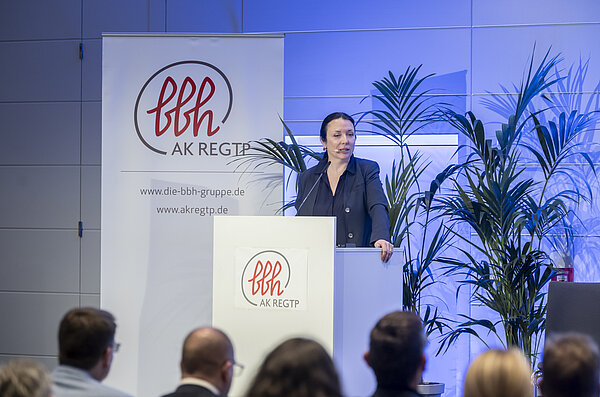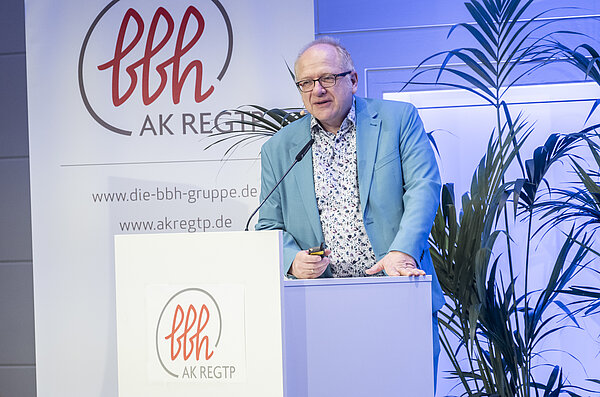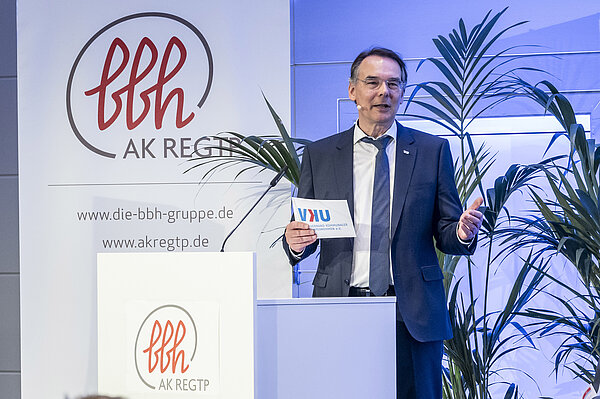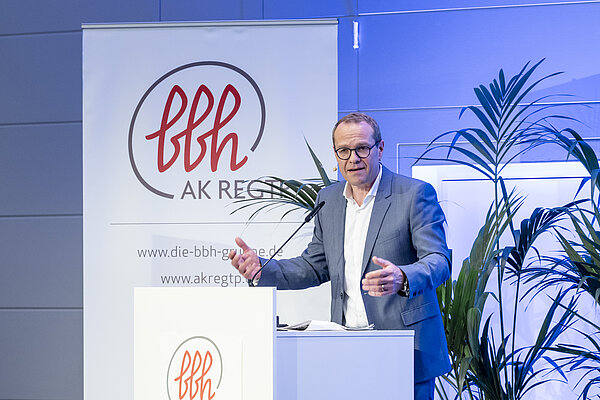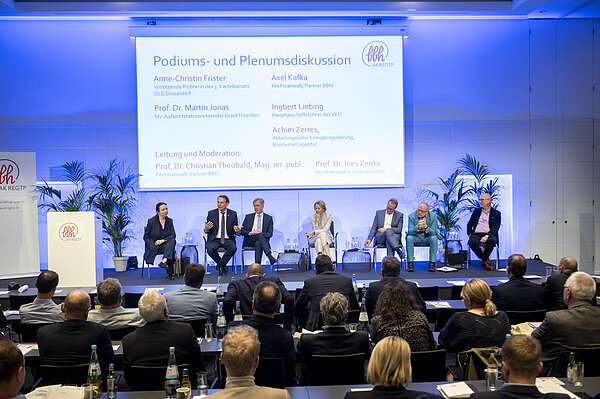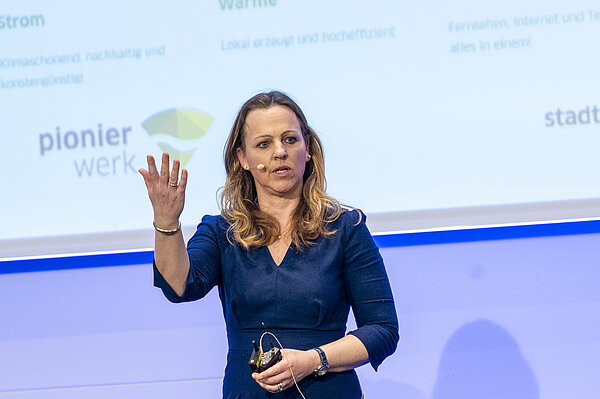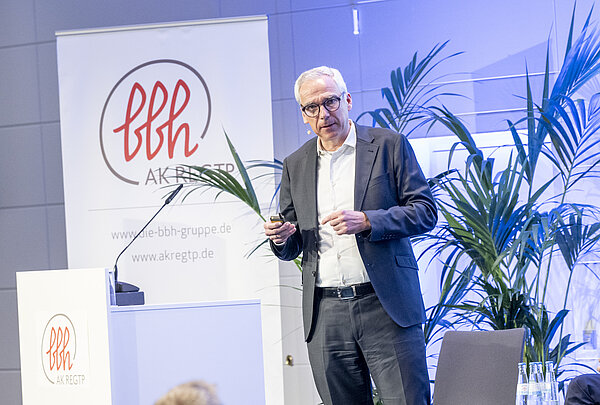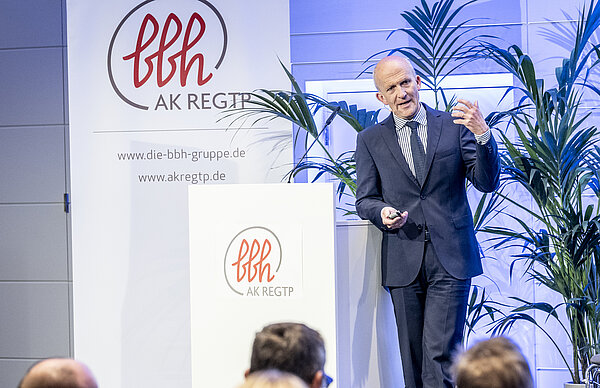19TH regulatory conference of the AK REGTP on 01/04/2025
Prof. Dr. Christian Theobald also looked back on the 20 years of service of BBH partner and lawyer Stefan Missling and BBH partner and lawyer Prof. Dr. Ines Zenke’s striking 30 years of duty: “Together, dear Ines, we not only sketched, but also brought the AK REGTP to life. You, dear Stefan, have quickly become one of AK REGTP’s playmakers.”
It was also very fitting that the 3rd edition of Prof. Dr. Ines Zenke’s “Good Governance” handbook was published just in time for the attendees to pick up a copy.
Prof. Dr. Ines Zenke opened and moderated the morning’s series of presentations and discussions that focused on grid regulation, efficiency enhancement and legal simplifications.
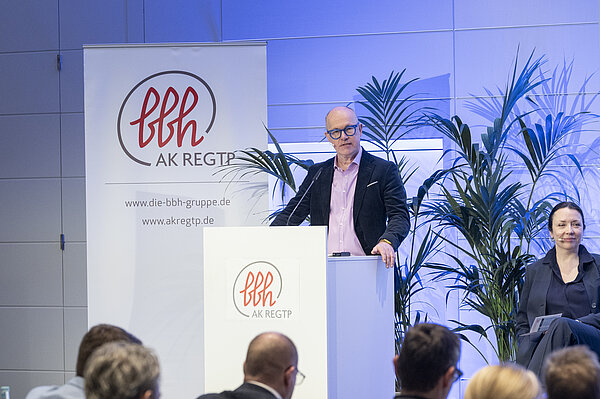

Revision of the Energy Industry Act: changing regulation
The revision of the Energy Industry Act 2025 marks one of the regulatory turning points. Achim Zerres, head of the energy regulation department at the Federal Network Agency (BNetzA), spoke about the expanded authority of the Federal Network Agency and the requirements placed on the future regulatory framework. The main focus was on grid costs (NEST) and grid charges (AgNeS). The aim here is to maintain an attractive investment environment, while ensuring cost efficiency and the alignment with the energy transition requirements. To respond more quickly to changes in costs, the regulatory period is shortened to three years.
Challenges of the energy transition and grid regulation
The next speaker was Ingbert Liebing, CEO of the German Association of Local Utilities (VKU), who called for stable political framework conditions across individual legislative periods. He identified micromanagement and planning insecurity as obstacles to achieving climate neutrality by 2045. The German Association of Local Public Utilities suggested setting up an “energy transition fund” to mobilise private capital for infrastructure projects.
The future regulatory practice from the perspective of case law
Anne-Christin Frister, presiding judge of the Cartel Panel at the Higher Regional Court (OLG) of Düsseldorf, emphasised that the judicial review of regulatory decisions is growing in importance, touched on various matters including the new room for manoeuvre, far (and further) reaching implications of the gas crisis and concluded by illustrating increasing complexities as a consequence and side effect of the new regulatory practice.
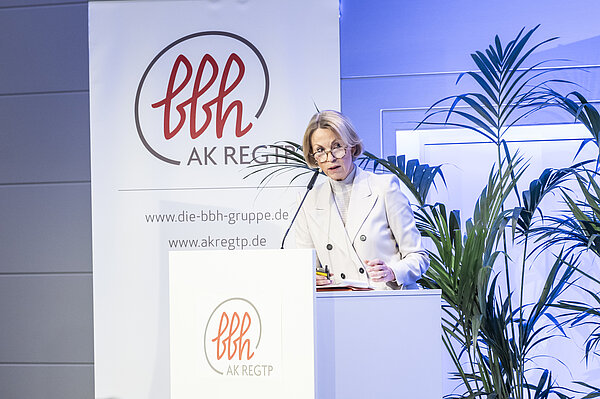
Minimum rate of return in regulation
Prof. Dr. Martin Jonas (deputy chairman of the supervisory board of GrantThornton AG) spoke about the importance of an adequate rate of return for grid operators. He stated that the Federal Network Agency continues to use historic averages for calculating the applicable rates of return on equity for grid operators, while a more market-related approach would be necessary. With regard to the billions of euros in loans envisaged by the future federal government in the next few years, Prof. Dr. Jonas commented on the increase in the interest rates this is likely to trigger; an effect that should be considered as well.
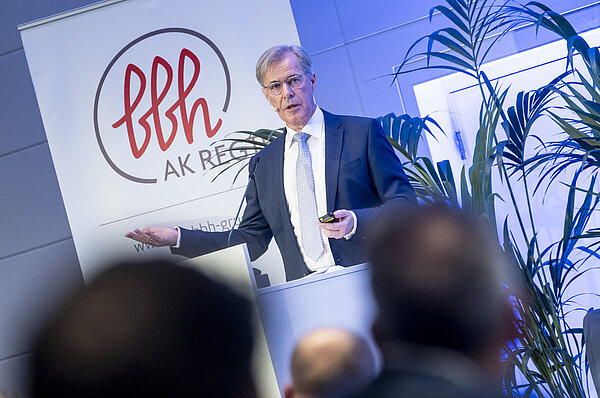
Efficiency as guiding priciple of the new regulatory framework
BBH partner and lawyer Axel Kafka examined whether the new regulatory framework for calculating the applicable rate of return for grid operators, which is currently being consulted in the NEST (transforming grids in an efficient and safe manner) process, reflects the Federal Network Agency’s commitment to cut red tape in regulatory procedures. Against the background of the current almost customary time lag between the start of a regulatory period and the Federal Network Agency’s determination of the revenue cap for the period, he particularly criticised the intended shortening of a regulatory period to three years and the deteriorating framework conditions for the simplified procedure.
Germany - An attractive place to invest?
In the ensuing panel discussion, the participants primarily discussed the adjustments to the regulatory framework that are necessary to ensure the investments required for the ongoing transformation of the energy and heat sectors. The idea of setting up a state-backed energy transition fund to incentivise private capital investment as intended by the future coalition partners was received positively by all participants. The panellists agreed that a safe investment environment and simplifications are decisive for mobilising capital.
A more controversial issue was the recognition of provisions regarding gas distribution networks. In its key issues paper regarding NEST from January 2024, the Federal Network Agency had initially announced that it would also recognise provisions for the necessary dismantling of gas distribution networks in view to the phase-out of carbon-based heat supply by the end of 2044. It has now changed its position and will only recognise provisions for the costs of decommissioning such networks.
Cooperation and mergers among municpal utility companies: Synergies as strategic response
Municipal utility companies are facing increasing challenges due to regulatory requirements and investment pressure. Field reports showed successful cases of cooperation, mergers and participations. Dr. Gerhard Holtmeier (managing director of Dortmunder Energie- und Wasserversorgung GmbH) stressed the importance of partnerships for safeguarding the future of municipal utility companies. Martina Butz (managing director of Stadtwerke Hanau GmbH) presented real-life examples of urban neighbourhood projects and smart home integration. Carsten Hoffmann (board member of GGEW AG) made reference to a merger of several municipalities for reasons of cost efficiency and Prof. Dr. Axel Thomas (managing director of GWG Aachen) added that mergers can even mitigate certain strategic disadvantages.
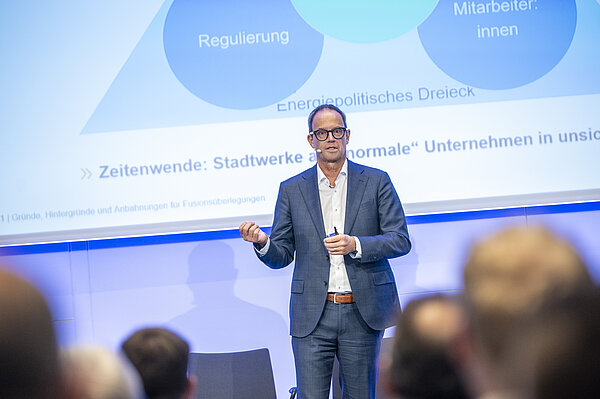
Panel discussion and outlook
The final panel and plenary discussion moderated by BBH partner and lawyer Astrid Meyer-Hetling as well as BBH partner and public auditor/tax advisor Thomas Straßer explored in detail the challenges and potential of cooperation and mergers among municipal utility companies. It became clear that operational synergies, the availability of human resources and financing opportunities are highly relevant factors. The requirements for potential strategic partners were discussed at great length. In conclusion, policymakers would be well advised to create stable economic framework conditions. This includes stable regulatory rates of return and help in financing investments with an energy transition fund as a central instrument to mobilise capital. The reduction of regulatory complexity and a more flexible legal framework were identified as decisive for ensuring success.
Prof. Dr. Christian Theobald concluded the event with an invitation to the 20th regulatory conference on 19/05/2026. The day ended with an evening event at a former pumping plant themed “with pump and circumstance”.



